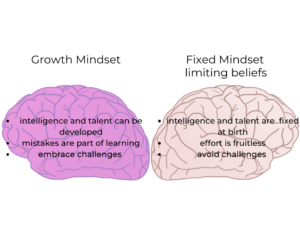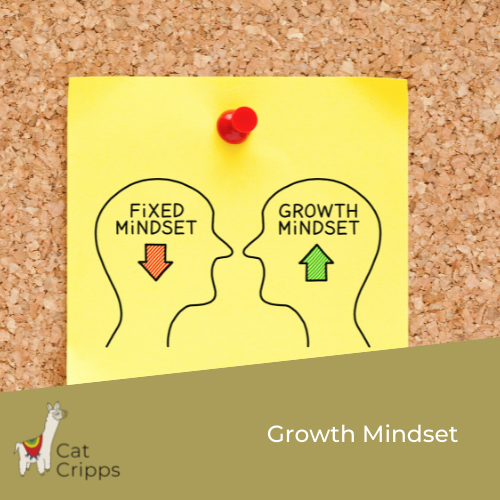I have had a few discussions on LinkedIn recently on a number of topics, one of which was “Impostor syndrome”, which is a topic I have introduced here before. That feeling you get when you think you are “not good enough” which may hold you back from seizing opportunities – and I talked about ways of overcoming those feelings.
The discussions led me to rethink the way I had been positioning how I talk about the “issue” – and I had promised a chat about Growth Mindset – so here are my thoughts!
Dr Carol Dweck in her book Mindset introduces the concept of the Growth Mindset vs the Fixed Mindset.
She started worked with children. She found that so many give up or say “I can’t do that”. You may have children who give up easily too? Or – it may be YOU! (There is a quote from someone who had read her work – “it was painful to read your chapter… as I recognised myself within”). You may recognise yourself too.
Some believe from an early age that they either have an innate ability to do something or they don’t. In fact – there is potential in all to learn and to do better.
She turns things around with the children and talks about the Power of Yet – if you say “I can’t do that…. YET” then it has a whole different meaning – and it encourages children to make an effort and to learn – freed from what she calls the Tyranny of Now – I know – a dramatic turn of phrase!
To reframe using Yet or Not Yet – gives children greater confidence and persistence where they feel able to give things a go.
So what does that mean for us?
Many of us when we get older just accept the way things are, and shy away from trying new things.
Have you ever said “I can’t do maths” or “I can’t speak languages”
Even as adults we really can learn new things – we just have to be open to the idea – I can’t do maths YET – I can’t speak Spanish YET. And it is amazing how powerful that little word is!
Lets look at the features of a Growth Mindset as opposed to a Fixed Mindset

With a FIXED mindset Intelligence and ability are fixed at birth, effort is fruitless (what’s the point), people avoid challenges and stay inside their comfort zone.
With a GROWTH mindset intelligence and talent can be developed, mistakes are part of learning, people embrace challenges!!
People with a Fixed mindset look at the success of others and feel threatened.
People with a Growth mindset look at the success of others and feel inspired!
Much of the point of Dweck’s book is to look at the effect we have on others – as parents, teachers or managers for example. But we can be equally hard on ourselves! Or we “learn” from what we hear others say – “girls can’t do science” or “old people can’t do tech”! But oddly enough we are more influenced by these common thoughts than we would like to think.
Stereotypes and negative labels are baaad – in all sorts of ways. Dweck tells of how she had a teacher who opined that “girls can’t do math” and she magically lost her ability to do math! And there is evidence that just ticking a gender or race box on a form can trigger the stereotype in your head and influence the answers you give – and lower your scores. Unbelievable? IF you have a fixed mindset.
HOWEVER – having a growth mindset helps you to combat this. If you believe that you CAN learn – you just haven’t YET – then you will overcome this bias.
The truth is – we can learn to adopt a growth mindset – even as adults. The old saying “you can’t teach an old dog new tricks” is completely false – unless you tell yourself it is true. It really is in your hands. No one said would be easy – but you just have to reframe your language – and the use of that word YET really helps!
So to return to the topic of impostor syndrome – of course it is not a real “syndrome” as it is not based on anything other than your beliefs! You “believe” you are not good enough. But you can convince yourself otherwise – or you can tell yourself that your feelings aren’t that important – and focus on the outcome you want for you or for those you are working with.
The idea of the Comfort Zone was another contentious LinkedIn issue. Of course this doesn’t exist either! But I do find it a convenient visual way of getting people to think differently. What keeps you in that “zone” where everything is easy is your belief system. You can choose to stretch yourself and learn – or you can believe that you “can’t” – the choice is yours.
If you push out of your comfort zone and keep trying to learn- by which I mean LEARNING (do or do not, there is no TRY*) – then the neurons in your brain form new stronger connections. So you can and WILL improve.
You can tell yourself you can’t do that YET.
You can take on new challenges.
You can keep trying and accept feedback.
And you will be amazed at what you can do!
If you would like to discuss further then please do Get in touch.
*Thanks to Yoda, May the Fourth be With You
